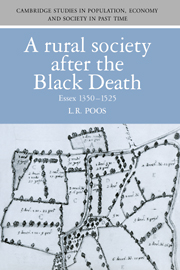Book contents
- Frontmatter
- Contents
- List of figures
- List of tables
- Preface
- Abbreviations
- Part I Reflections on a transitional era
- Part II ‘Country-dwellers, common folk and craftsmen’
- Part III ‘The total sum of all persons’
- Part IV ‘While it is so forward between us’
- Part V ‘She came that day seeking service’
- 9 Servants
- 10 Wages and labourers
- Part VI ‘Beware of such holy men’
- Part VII Synthesis
- Bibliography
- Index
- Cambridge Studies in Population, Economy and Society in Past Time 18
10 - Wages and labourers
Published online by Cambridge University Press: 14 September 2009
- Frontmatter
- Contents
- List of figures
- List of tables
- Preface
- Abbreviations
- Part I Reflections on a transitional era
- Part II ‘Country-dwellers, common folk and craftsmen’
- Part III ‘The total sum of all persons’
- Part IV ‘While it is so forward between us’
- Part V ‘She came that day seeking service’
- 9 Servants
- 10 Wages and labourers
- Part VI ‘Beware of such holy men’
- Part VII Synthesis
- Bibliography
- Index
- Cambridge Studies in Population, Economy and Society in Past Time 18
Summary
Both labourers and servants played important roles in the rural workforce of later-medieval Essex. But in comparison with servants, unfortunately, local sources during the period are much more reticent about the qualitative or experiential details of labourers' lives. Litigation in local courts concerning simple daily hiring was rare, doubtless less worthwhile pursuing because of the smaller sums involved than was the case with servants' annual stipends. Debt and contract suits in which short-term employees did appear as plaintiffs in these courts dealt most often with situations where employers hired workers along with their equipment or animals, or where employer and employee were entangled in other financial transactions as well. At Hatfield Broadoak in 1413, for example, William Lancastre sued Johanna atte Watere for 2s. 4d. for two days' ploughing he had done for her (using his implement) plus 4d. for pasturing her animals on his land. The evidential filter of the legal tribunal necessarily emphasises these more complex cases at the expense of ordinary day-labourers' hire.
Nevertheless, previous chapters have outlined a quantitative profile of the district's labourers. Comprising about one-half of local ‘households’, labourers were more mobile, settled later in life, and were less likely to be married than their contemporaries. They were a great deal more likely to dwell in households of their own, in contrast to servants, but this was not universal: John Fuller, a ‘common labourer’, deposed in 1474 that he had lived in Coggeshall with William Oldale and William's father for the past six years, but before that he was in Combs Ford (Suffolk) and ‘lived by himself’ [tenuit familiam per se].
- Type
- Chapter
- Information
- A Rural Society after the Black DeathEssex 1350–1525, pp. 207 - 228Publisher: Cambridge University PressPrint publication year: 1991



